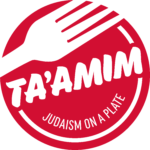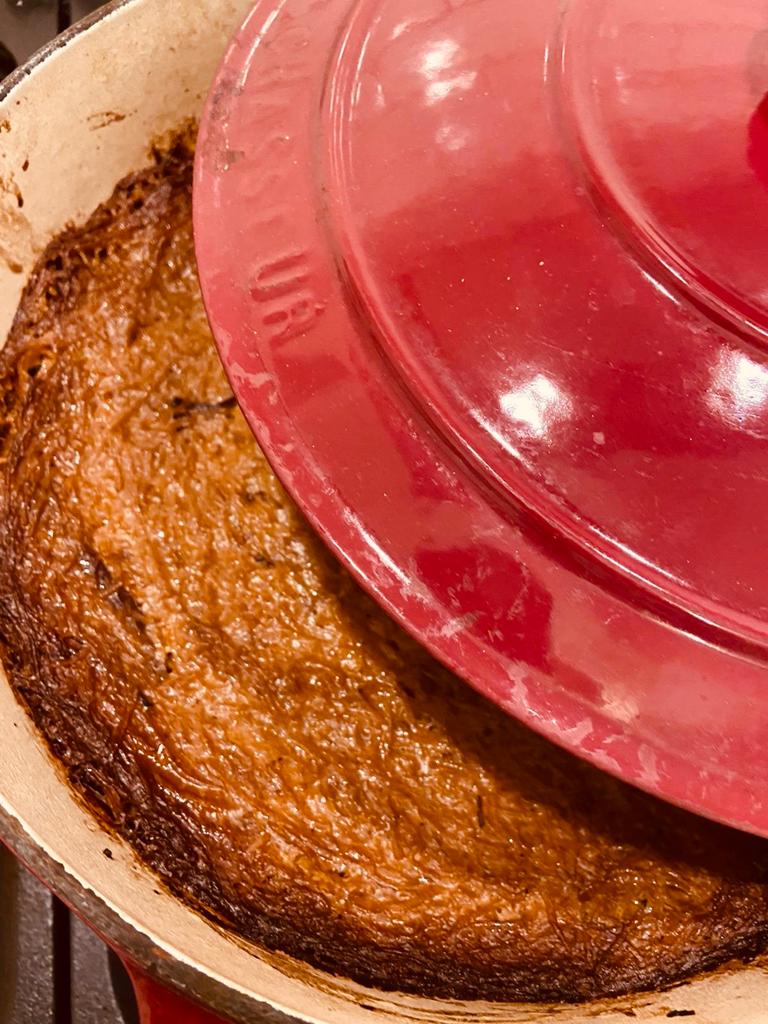A dish of new traditions inspired by my daughter in law Addi.
In looking for the history of Yapchik, a dish that has gained popularity in America over the last ten years. It is a slow-cooked potato kugel that is cooked overnight, usually with a meat layer, I couldn’t actually find any. That doesn’t mean it wasn’t an old-world dish, just that it wasn’t universally known.
The only reference I could find was of my own recent experience, in the summer and autumn of 2019 I had the great privilege of working with Holocaust Sourviiour Josef Lewkowicz, in his memories he mentions that his mother would make a dish for Shabbat called Yapchik. I don’t know if this new version has any similarities with the one of Josef’s memory, but it definitely is a dish redolent in Yiddisha (Jewish) Haimish (cozy/homey) goodness.
The warmth and comfort of this dish is the next evolution in the story of the Shabbat stew, a Shabbat stew wasn’t just about observing the laws of Shabbat, it was about families and friends getting together to share a meal closing out the harsh outside world, and concerning themselves for just a day within their traditions and customs, and thus it isn’t surprising that new customs have emerged from the old.
Cooks notes: you can use any leftover beef for the meat layer, or like my daughter in law leave it out altogether, here I give you the recipe for my slow cooker brisket that will make just enough for the meet layer but feel free to use any cooked meat, such as pastrami, salt beef, or leftover roast or brisket.
For potato kugel
- 3 medium onions, peeled
- 2 kilo (4.4 lbs) potatoes, peeled
- 5 medium eggs
- 80ml (⅓ cup) tablespoons oil
- 2 teaspoons table salt
- ½ teaspoon pepper
- 40g (¼ cup) potato starch (or cornstarch)
- 235 ml (1 cup) boiling water
- 2 tablespoons oil (if making in a dutch oven)
Slow cooker brisket:
- 500 g (1 lb) brisket
- Salt and pepper to taste
- 1 tablespoon vegetable oil
- 1 large onion finely sliced
- 2 cloves garlic, minced
- 235ml (1 cup) dry red wine
- 235 (1 cup) orange juice
- 2 tablespoons ketchup
If making the brisket, start this at least 4-5 hours before you plan on putting up the Yapchik, see directions below for the brisket.
In a food processor fitted with the blade attachment, process the onions until they look like a mushy mess, remove from the processor and place in a large bowl.
Replace the blade of the food processor with the fine grating disk, grate the peeled potatoes and add them to the onions in the bowl.
If using a dutch oven, heat a couple of tablespoons of oil at the bottom of the pot, while you mix the kugel ingredients together. If using a slow cooker, skip this step.
Add the eggs, salt, and pepper and mix well, sprinkle the potato (or corn) starch on top of the mixture and pour the boiling water over the whole thing, and mix well.
Place half the potato kugel mixture at the bottom of the pot, and even out over the whole surface. Now top with an even layer of shredded beef or beef cut into bite-size pieces, cover with the remaining kugel mix.
Cover the pot and place in the oven for 8-16 hours at 110℃ (220℉). If using a slow cooker, cook on low overnight until ready to serve.
For slow cooker brisket:
Rub the beef well with salt and pepper. Heat oil in a saute pan over high heat, add the beef and brown well on both sides. Place the browned beef in the slow cooker. Add the sliced onions to the now-empty saute pan, cook the onions until they are soft and starting to turn golden.
Add the garlic and saute for another 30nseconds until fragrant. Use about a tablespoon or two of the wine to deglaze the bottom of the pot, scraping all the brown bits off the bottom of the pan.
Turn off the fire, add the onion mixture, remaining wine, orange juice and ketchup to the slow cooker along with the beef.
Cook on high for 3-4 hours or low for 6-8 hours, until a fork, inserted into the beef, pulls out with no resistance.
If using the brisket for Yapchik allow it to cool a bit before shredding. To shred; lift the beef out of its gravy, and using two forks, one to anchor the beef and the other to pull the beef away, shred all of it. At this point, you can discard the beef or use it for gravy over mashed potatoes, but you won’t need it for the yapchik.


